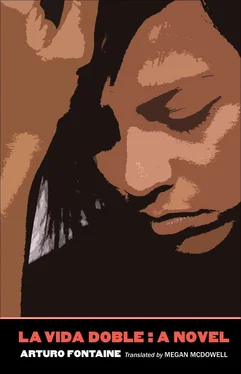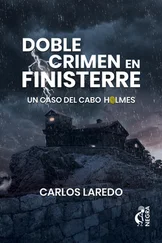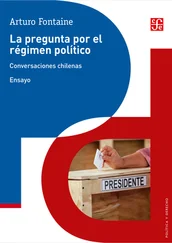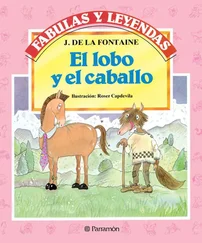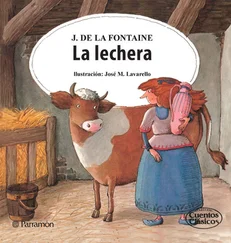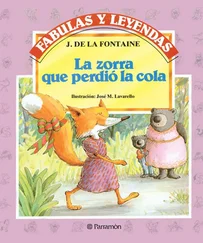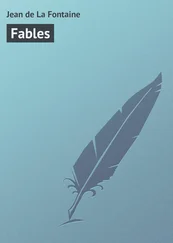“Alive?” she asks me, her eyes very wide.
When the situation finally changed, when the damned dictatorship finally came to an end and the country recovered democracy, a couple of lawyers showed up unannounced at my apartment in Stockholm. They were Chilean. I let them in, resigned. Just like that time when a white Mazda pulled up and I recognized Ronco’s voice, I sat down with them obedient as a worn-out ox. They knew my story. I was a victim, they insisted, and I needed to give my complete testimony. They convinced me. Roberto — I was still with him then — really encouraged me to do it. He thought it was my duty, he thought it would do me good.
I traveled incognito to Chile, with bodyguards and a new fake identity, and I testified for hours and hours in front of a judge. I testified for several days. I denounced them. I told what I saw, what they did to me, something, the minimum, about what I did myself. They brought me face to face with some of the thugs, the ones related to that particular judge’s cases. I gave blow-by-blow accounts in those trials. I omitted what they didn’t ask about, I omitted everything related to other crimes, I omitted my own participation in those events. When they brought in a tall man, very bald, with the little hair he had completely white over his ears and the nape of his neck, thin but with a paunch by now, deep wrinkles on his face, and I recognized Flaco Artaza’s smile, I felt pity. He entered in handcuffs. Only then did I find out his real name.
He had spent a long time as a defendant and a prisoner. He greeted me with dignity and a trace of affection. He was upright. He was quiet while I answered the judge’s questions. He shrank into himself little by little. But he never lost his calm. He bore it all nobly. “I never thought you would want to destroy my life,” he told me on his way out. He wasn’t angry but rather sad and disappointed, it seemed to me. “Why me? Why like this?” he said. When he was about to disappear, surrounded by guards, he turned his head and threw me one last, solitary look.
I wavered: Shouldn’t I tell them everything and turn myself over to Justice once and for all? There were other cases in which they could be looking for me, though they may not know it exactly, or in which I could provide information. Wasn’t it only fair that I should also pay in jail for what I did, though it would mean being away from Anita, away from the Baltic Sea, from my freedom?
At that moment, someone spoke to me and I gave a terrified jump. A scrawny old man had sat down next to me, his matted hair somewhere between white and red, long ears. He was wearing a dark brown suit, dandruff on his narrow little shoulders, a yellow shirt, and a tie with a gold sheen.
“I’m Rat,” he told me, “Rat Osorio. You remember me?”
And of course I remembered and would always remember.
“I knew you at Central, remember?”
And when he saw my frightened, surprised face:
“I’m Inspector Pedro Ortiz, of Investigative Police.”
He slid a card between my fingers. I was overcome with a shame I had never felt before. Shame of having been subjected by this rat, this thug, shame that his insults had been able to wound me. Disgrace. That’s what it was. Not shame: disgrace. I barely contained the feeling.
“I was always a detective with Investigations; during that ‘black’ time I was only at Central in commissioned service. I was assigned there, that’s all. Now I’m in charge of several criminal cases in which ex-agents of Central are directly implicated, get it? My duty is for justice to be carried out.”
Quick lights flashed across Rat’s restless, astute eyes. There was a slight vibration in his nostrils. Was he smelling me? Again on the side of the victors, a snitch just like me, I was thinking: this wretch, my double, my brother, I was thinking.
I wonder why I am there, why I have informed on Flaco and the others I used to know. Am I hoping for forgiveness? And who could forgive me? He goes on watching me, waiting, he wants to decipher any sign I give. I lower my gaze.
And I’m telling myself again that there’s no justification for what I did. Can one ask forgiveness, then, for the unjustifiable? And if so, on what grounds? It would be asking for a gift. Because that’s what forgiveness is: a gift. Why should that gift be asked for and not others, which are simply received? And if I did ask for it, what would happen if it wasn’t granted?
“Iris, you remember Iris? She killed herself.” He put two fingers in his mouth to simulate a gun. “With her own CZ, it was. But they can’t fool me that easy, no way. . I wasn’t born yesterday, y’know?” He purses his lips in a disdainful gesture. “If you ask me. . she got smoked. That chick knew too much, wouldn’t you say?”
“And what about Macha, and Gato?” I asked him.
“The Law is looking for Macha and its arm, as they say, is loooong. Big things, ugly ones. Both his alibis fell, you know? Jacinto Hermosilla Ruiz is Macha Carrasco’s real name.” He tells me this proudly. “As for Lisandro Pérez Olmedo, he’s named in old files for thirty-four cases: some nasty things, y’know? For example, the death of a young man who fell, according to Macha’s deposition, because he disobeyed the order to stop and he covered the Spartan’s flight with an AKM. Macha shot him down — I mean, Lisandro Pérez Olmedo did — from the roof next door, according to his testimony later that night. And they haven’t found Macha. He left the country. Illegally, of course. But they’ll nab that fucker. . There are three men, I’m telling you, three experienced agents who used to be in Central and who are looking for him now. We don’t know their real identities. We don’t know if they answer to disconnected groups of ex-agents trying to protect themselves from the law or if Military Intelligence sent them and is secretly giving them help. It’s possible. They deny it, of course. But Military Intelligence must be trying to get rid of evidence and witnesses of what they did at Central. To save the ones at the top, you get me? Those three ex-agents managed to cross the border in spite of the precautions we took, and they left with the order: shoot Macha’s mug full of holes before Investigations gets their hands on him, before we haul him in here in cuffs and get him singing, shit. Macha’s fucked: by next spring he’s either pushing up daisies or behind bars. .”
“And Gato?”
A shine in his small eyes.
“No one talks about him. He turned, was what I heard.” And now in a whisper and looking at me with narrowed eyes, he makes a gesture indicating money: “He’s protected. He’s collaborating. He’d been doing it for a long time, selling information. He talked about you and gave them your information.”
On that trip I saw my parents for the last time, in their separate places, both of them sick. My mother received me very calmly, with a new calm that was perhaps the product of her medicines. She was on saline. She asked about Anita, whom she saw rarely, if ever. About me, almost nothing. She didn’t shed a tear when I said goodbye, but she squeezed me tightly. My father, on the other hand, wept from the moment he saw me set foot in his room. The chemotherapy had taken all his hair and his skin was a greenish white. In his arms, the jelly of his old tennis player’s muscles. I wanted to go to El Quisco. He wanted us to go together. His little summerhouse was still there, waiting for me. So was the sea. He repeated that several times. In the end I didn’t go.
You need to go to the bathroom? Of course! Look, it’s easy: end of the hall to the left. You can’t miss it. Why are you looking at your notebook? You don’t trust me? Take it with you then; here, take it with you if you want. No?
Читать дальше
